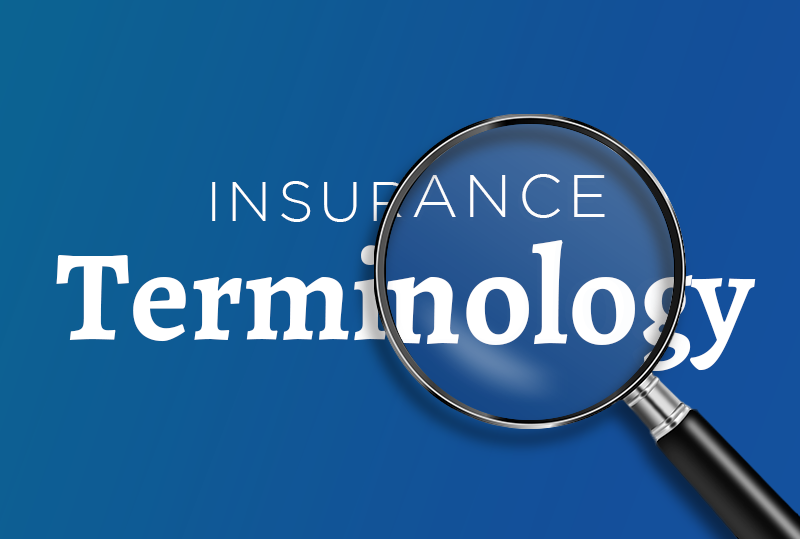Insurance Terminology
Whether you’re searching for personal or business insurance, you may face some terms that you’re not familiar with. To help you understand the terminology better and to guarantee your safety and understanding when purchasing insurance, we’ve gathered some common terms and definitions.
A
B
- Beneficiary:
A person designated as the recipient of funds or other property under an insurance policy. With life insurance, the beneficiary is the person or entity entitled to receive the claim amount and other benefits upon the death of the person insured.
- Broker:
An intermediary between a customer and an insurance company. Insurance brokers search the market for coverage that is appropriate to their clients’ needs.
C
- Claim:
A claim is a formal request by an insured individual to an insurance company for coverage or compensation for a covered loss or policy event.
D
- Deductible:
A specified amount of money that the insured must pay before an insurance company will pay a claim. The amount is established by the terms of the coverage. The bigger the deductible, the lower the premium charged for the same coverage.
- Depreciation:
The decrease in value of any property due to wear, tear, and/or time.
E
F
- Face Amount:
The amount of money for which an insurance cover is obtained, usually shown on the top sheet–or face–of the policy. In life insurance, it’s the dollar amount that the insurance policy would pay out upon the death of the Insured. Also known as “death benefit”.
G
- Grace Period:
A period after the payment due date during which the premium may be paid without penalty. The insurance remains valid during this period.
H
- Homeowners Insurance:
Homeowners insurance is a form of property insurance that covers losses and damages to an individual’s house and to assets in the home. Homeowners insurance also provides liability coverage against accidents in the home or on the property.
I
- Indemnify:
The act of compensating the victim of a loss by payment, repair, or replacement. This compensation can be in whole or in part.
- Insurability:
Insurability is the degree to which a person or a company is considered insurable by an insurance company. It is an assessment of potential risk.
- Insurance Score:
Insurance scores are confidential rankings based on credit information. The score is based on the individual’s credit rating and will affect the premiums they pay for the coverage. A higher score will result in lower premiums and vice versa.
J
K
- Key Person Insurance:
Key person insurance is a life insurance on the key person in a business–the people who are crucial to a business, the ones whose absence would sink the company.
L
- Liability:
A liability is a debt, responsibility, or obligation, especially a financial one.
- Liability Insurance:
Liability insurance provides protection against claims resulting from injuries and damage to people and/or property. Liability insurance covers legal costs and payouts for which the insured party would be found liable.
- Life Insurance:
Life insurance is a form of insurance that pays out a sum of money upon an individual’s death to those he or she has designated as beneficiaries, giving them a financial safety net.
M
- Mortgage Insurance:
Mortgage insurance is an insurance policy that protects a mortgage lender or titleholder if the borrower defaults on payments, dies or is otherwise unable to meet the contractual obligations of the mortgage.
- Mortgage Lender:
A person or company that loans money and takes a security interest in real estate.
N
O
P
- Peril:
The cause of a possible loss. For example, with car insurance, the peril can be theft or collision.
- Policy:
A written contract for insurance between an insurance company and the insured individual stating details of coverage.
- Post-claim Underwriting:
Post claim underwriting is a practice whereby an insurance company, which has reason to know or suspect adverse prior medical history for you, waits until you file a claim before spending money to confirm its suspicion and then asserts that no coverage exists; therefore no claim can be paid.
- Premiums:
The monthly or annual amount that one individual must pay in order to have the insurance coverage.
- Proof of Loss:
Documents showing the insurance company that a loss occurred.
Q
R
S
- Security Interest:
A security interest is a legal right granted by a debtor to a creditor over the debtor’s property which enables the creditor to have recourse to the property if the debtor fails in making payment or otherwise performing their obligations. One of the most common examples of a security interest is a mortgage.
- Solvency:
Insurance companies’ ability to pay the claims of policy holders.
T
- Title:
The legal document conveying title to a property that is the evidence of a person’s right to possession ownership of a property.
- Titleholder:
The person who has the right to own a property and has a document to prove this (title).
- Title Insurance:
An insurance policy that protects residential or commercial property owners and their lenders against losses related to the property’s title or ownership.
- Travel Insurance:
Insurance to cover problems associated with travelling, such as trip cancellations, lost luggage, and other incidents.
U
- Underwriting:
The process of assessing the risk people applying for insurance present, to determine the coverage they are eligible for and ensure their premium cost reflects their level of risk.
V
- Void:
Occurs when a policy becomes free of all legal effect. For example, a policy can become voided if the information given by the insured is proven to be untrue.
W
X
Y
Z

